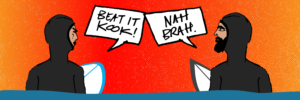You’ve heard a lot about the wholesome, soulful side of surfing. That’s what draws most of us in. It is the current that runs strongest through surfing. It is the side that I choose to focus on. Yet, as with all things human, our less wholesome tendencies find a way in. We always bring ourselves along wherever we go.
Good waves are hard to come by. Perfect waves even more so. A good wave is rare and highly sought after, and so it is a valuable thing. Like other rare and valuable things, good waves are regulated and fiercely protected. In the surfing world, that complex system of enforcement is called localism.
Localism is the expression of a protective instinct: a wave kept secret, a spot closely guarded, a form of ownership exerted over certain waves or stretches of coastline, a break regulated by a group of surfers who lay claim to it.
It manifests in a number of ways, some subtle, some overt. It is on display in messages left at surf spots: “Locals Only” scrawled across a sign. It can be something as simple as being “vibed out” when in the water — being ignored or disregarded, given dismissive looks, made to feel unwelcome. It is something you encounter nearly anytime you surf somewhere that is not your home break.
You may park at a new spot, surf, and return to find your windows caked in surf wax, some colorful phrase written on your car. It’s somebody’s way of saying, “You’re not welcome. Don’t come back.”
I’ve seen a cinder block thrown through a windshield, tires slashed, furious arguments in the water, escalating to blows. Grown men treading water, engaged in naval battles, throwing punches without any ground to stand on. Whitewater and froth flying, blood thinned by seawater. Boards taken and their fins stomped clean off. When tensions run high, someone invites the other to the beach and there are full-on fistfights and brawls right there at the water’s edge. Busted boards, broken bones, and shattered egos. It’s not all hippies holding hands and cheering each other on.
In some cases, for highly sought after or treacherous waves, gangs have taken control. Pipeline, located on Oahu’s North Shore, is one of the most famous waves in the world. Everyone wants to surf it. Not everyone can or should. In 2001, in response to overcrowding and dangerous behavior in the water, a group of Hawaiians formed a gang called the Wolf Pack. They were hard-charging locals, all trained in jiu-jitsu, who tightly regulated the wave. They decided who could surf there and who could not. There were many accounts of violent fights on the beaches around Pipeline during those years.
Another well-known surf gang was the “Bra Boys” of Maroubra, Australia. They took over a place called Cape Solander, the end of which has a mean and serious wave, and renamed it “Ours.” They had ties to organized crime in their home city and became the focus of a 2007 documentary narrated by Russell Crow, Bra Boys: Blood Is Thicker Than Water. Their members have the Maroubra zip code tattooed on their backs and “My Brothers Keeper” across their chests.
The simple, pure act of riding waves, in the hands of men, cherished for its beauty, corrupted in its service.
Localism exists on the Cape. It tends to show up in subtle form, more as a safety concern than as a point of pride and posturing. Because Cape surfers are usually well-traveled, they know how it feels to be the other, the outsider. They tend to have a more welcoming attitude. Still, Cape surfers are private and protective of their home break. They ask photographers not to reveal where their pictures are taken. If people start to get a little too comfortable or entitled in the lineup, a reminder is given.
The Cape, because of its geography and exposure, tends to self regulate. This place provides its own protection. It gets good. Really good. But it is fickle: cold, remote, hard to predict, nearly impossible to get it at its best even for those who live here.
Localism is deeply ingrained in surf culture and history. The same tribalism that bonds surfers as a whole, practiced on a smaller scale, allows for division and for the creation of the other. It speaks of the most basic tendencies that have allowed us, as humans, to survive. And of the very basic self-serving instincts that have driven us apart.
Even here there is no escaping our simple animal nature. Protect what feeds you so that the resources remain, so that I may feed mine.



